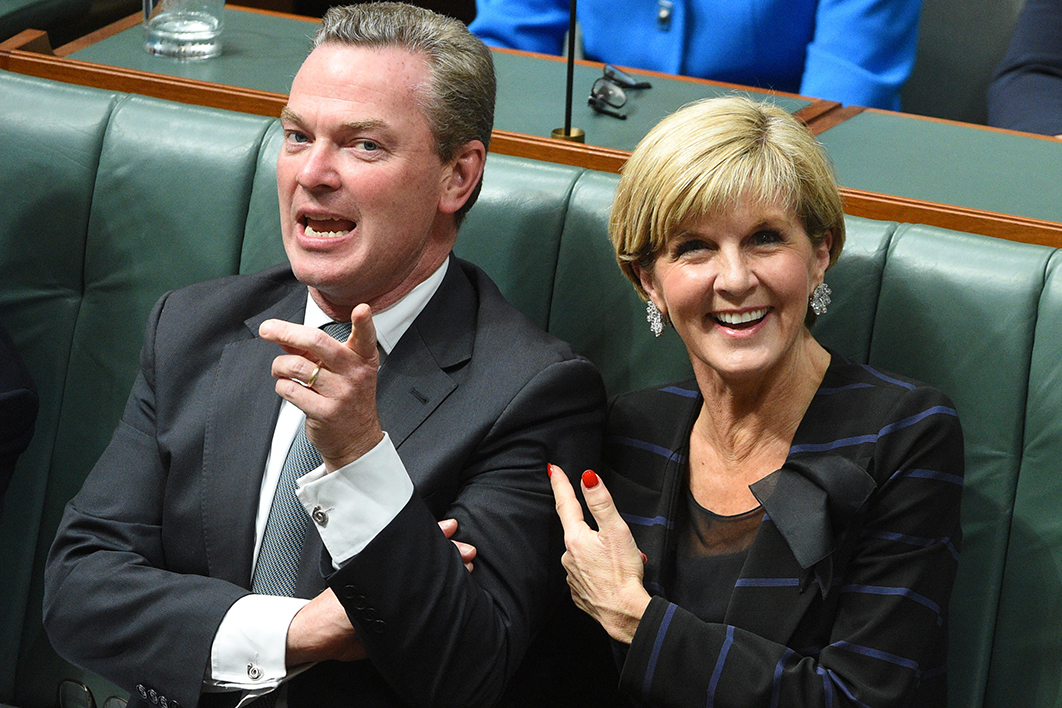Regulating Lobbying: A Global Comparison
By Raj Chari, John Hogan, Gary Murphy and Michele Crepaz | Manchester University Press | £19.95 | 256 pages
Just a couple of weeks before the recent federal election, retiring minister Christopher Pyne invited a couple of journalists covering the defence round to his parliamentary office. There, over drinks, we discussed life, politics, defence procurement, and what he was likely to do once he finally departed the political scene.
Departed? Well, not quite.
As it happens (and without spending a single day on the dole queue), Pyne appears to have found highly remunerative work with consultancy firm EY. His colleague Julie Bishop (who was also on the wrong side of the Liberal leadership stoush that delivered us prime minister Scott Morrison) has been similarly besieged with requests to join boards or take on chancellorships. It seems Pyne had only to leave the building for his (genuinely remarkable) skills to be recognised by business.
Having spent more than half of his life in politics, the former minister probably can’t remember how to blush. EY, however, has apparently been surprised at the public backlash from its new hiring. The company is, however, highly unlikely to fire the irrepressible politician who has been known to so many, for so long, as “young Christopher.”
There’s a reason for that. Pyne’s been such a fixture that I still expect his smiling face to suddenly bob up, infusing Canberra’s drab corridors with colour and quick laughter. “Ah, Nicholas,” he’d reliably begin, before identifying which particular atrocity I’d committed in my latest column: how I’d actually got it all wrong and why I really should pay proper attention to his particular deconstruction of the facts instead of making assumptions that may not necessarily be true.
That was — is — the singular talent of Pyne. Even when he was busy telling you off, you knew it wasn’t personal. He’s always been emotionally clever enough to quarantine any personal feelings; intellectual enough to grapple with alternative ways of constructing the world; and knowledgeable enough to strategically marshal appropriate arguments backing his particular conclusion, whatever that happened to be at that particular time — even if, just possibly, he may have privately argued for the exact opposite position in cabinet.
Many people, particularly those who’ve never met him, will happily offer up their opinion of his character. First elected at the tender age of twenty-five way back in 1993, he occasionally claimed to be “father of the house,” or the longest-serving MP. As with many of his assertions, alas, this depended on exactly how you counted, which is the secret of politics and, no doubt, consulting as well. Adding two and two together does, indeed, make the number four. Nonetheless, with some imagination and a solid sprinkling of fairy dust, the result can also be construed as a very solid foundation for the number five. Indeed, almost six, really. Sell that idea to a politician and suddenly you’ve got a deal: one that’s often worth a lot of money.
And there’s the rub. The last time anyone asked the federal Parliamentary Library to research the influence of lobbyists was back in 2014. It seems this is not an issue that our government is concerned about. Perhaps it should be.
After all, was Pyne employed by EY simply because he is an ornament to their consulting practice? Or might it be because he possesses inside knowledge that he’ll use to subvert the proper process of government as it slowly works out how to spend billions of dollars of your money? Can we trust the processes of government to roll on ponderously and smoothly, regardless of the enormous quantum of inside knowledge, goodwill and patronage that departs with someone like Pyne? Is it desirable to regulate former ministers or, perhaps more appositely, is it even possible to do so? What’s the experience of other countries?
By happy coincidence, these questions are tackled in the newly released second edition of Regulating Lobbying, a sweeping review of the international scene, including Australia. New transparency and regulatory initiatives have required the landmark first edition to be urgently replaced, the authors tell us, and their book “comprehensively examines jurisdictions worldwide and investigates whether some measurements of the robustness of lobbying laws are more valid and reliable than others.” Perhaps unsurprisingly, Australia is slated as merely possessing “medium robustness” when it comes to regulatory measures governing lobbying (although you need to get to the second-last page of the text to discover this damning judgement).
This book was, of course, sent to the printer well before the furore about Pyne and Bishop, but way after a succession of similar jobs had been taken by Coalition and Labor MPs over the past decade. (It’s probably also worth noting that Bishop apparently won’t be paid for her work as ANU chancellor, and both former MPs have been cleared by the PM to take on work.) Indeed, Pyne’s move to EY appears to demonstrate considerably more integrity than the options some of his former colleagues have rushed to accept. He has eschewed working for communications companies accused of acting as agents of a foreign power, or for armaments companies that have overcharged the government, or, come to think of it, for gambling concerns.
Regulating Lobbying offers a path to a better way of navigating the murky waters between the decisions of politicians, the urging of paid lobbyists and the process of government. If you want an overview of what should be done and how appropriate standards have been pursued and implemented overseas, this is your book. It’s all laid out clearly. Here are legislative frameworks introduced by the early adopters of such systems (Canada, the European Union and the United States) and by countries where regulations have been introduced more recently (Hungary, Poland and Australia). Detailed comparisons are made and examples from different jurisdictions carefully drawn. The key insight here is the critical role of transparency.
But, of course, drawing comparisons between countries with widely differing societies and histories can be hazardous. It’s clear, for example, that even though Australia, the United States and New Zealand are all democracies and share so much culturally, every instance is different, and recognising that controls operate within particular political environments is vital. This is nowhere more obvious than when considering regulatory systems designed to stop people, or organisations, attempting to get around the rules.
Different countries have tackled this in different ways. What this book manages to do, very effectively, is offer an overview of alternative approaches. The reader is left in no doubt that there is no silver bullet, no single way of taming lobbying, and that’s because the cultural and historic context is always paramount. Nevertheless, using a light touch to pursue particular examples allows the authors to find a way of integrating a myriad of regulations into a broad overview. This makes the work a useful contribution to the field, even if it doesn’t provide a recipe book for Australia.
It’s no surprise that lobbyists manage to infiltrate weakly regulated systems, and it’s tempting to draw up a list of “best practice” regulations from the many examples, but this will only be half an answer to the problem. The obvious conclusion to be drawn from the book is that reducing the influence of lobbyists won’t come from simply implementing legislation. This is a deeply cultural issue. That’s why the question this book sets out to address isn’t really the first one Australia needs to answer. Instead of asking how we can better regulate lobbyists, a question with a more illuminating answer might be why we haven’t really bothered trying.
Even if they’re not prepared to articulate such sentiments openly, lobbyists are, by their very nature, attempting to influence and change political outcomes. Boiled down to its essence, this is their role. Lobbyists exist to influence politicians and subvert straight political processes to reflect the desires of those who employ them. The key is to reduce or confine their malign influence while still allowing genuine representations from individuals or interest groups that might otherwise be adversely affected by legislation.
It’s clear that the authors believe transparency is the answer. Nothing will send the cockroaches peddling malign influence scuttling away faster than the spotlight of exposure. Unfortunately, this is desperately missing from the Australian scene. The leading home-grown expert on integrity regulation is David Solomon, from the University of Queensland. He recently made a scathing comment about the influence and success of people like Pyne. “The government just doesn’t want to acknowledge how much lobbying these professions actually do.” •




